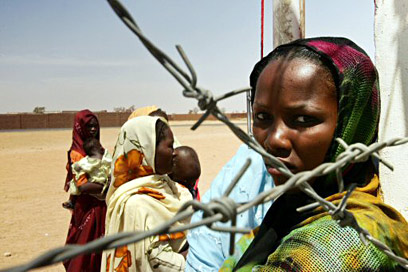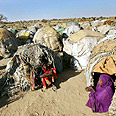Testimony from other side of border: How they smuggle in refugees
From enticing rumors about life in Israel, to covert meetings with Bedouin smugglers in wretched cafes in Cairo, to the journey to the border in crowded trucks for $500. How the smuggling of Sudanese refugees from Egypt has become an industry of false hope
“Life in Israel is a dream for the Sudanese citizens who have escaped to Egypt,” said Tony Mao Tioblis
(29), a refugee from Darfur who was caught by the Egyptian army while trying to infiltrate into Israel, and is now being held in a police station in Rafiah.
“In Egypt they treat us terribly, we desperately need protection, a place to live, and a livelihood so that we can support our families who were left behind,” he answered when asked why so many people are waiting for the moment when they can cross the border.
“I heard that in Israel you can easily find work, and I hope to get there in the end, to save some money and send it to my wife and three children so that they can join me.”
On the other side of the border in Egypt, for thousands of Sudanese citizens who escaped their bleeding country and are living on the outskirts of the wretched slums surrounding Cairo, the only hope is the rumor that a better life awaits them in Israel.
While Tioblis failed in actualizing the dream of a new life, every day dozens of others try to cross the breached border at the edge of the Sinai. “I understood from many other people that Israel welcomes the Sudanese with open arms and even gives them work and refugee permits,” he said. News of the sad fate of those who have managed to arrive here, had not reached him and his neighbors in the poor neighborhood where he lives.

Sudanese refugees: Praying for a better life (Photo: AFP)
Human rights activists in Cairo who help the Sudanese refugees, and the thousands of other people who have escaped other unstable governments in Central Africa, try to dissuade them from infiltrating into Israel - but it is in vain.
“The rumors running through the refugee community pull them in with a magic wand,” explained the activists. "They believe that a better life awaits them in Israel, and they are burning to leave Egypt where they are susceptible to harsh prejudice, exploitation, and dire poverty. Some of them have heard about people who were absorbed into hotels in Eilat, or Ehud Olmert’s promise not to abandon the refugees who have already arrived. Our attempts to explain that this is not the situation do not help.”
These rumors, it turns out, are also prevalent among the Egyptian soldiers and policemen, even those with experience of staunching the wave of refugees. “We have information that Israel has set up absorption camps for the refugees, and that Israel wants them to come work on the farms,” said a senior officer who serves in the northern Sinai.
According to him, “we have reinforced our security services, but it is almost impossible to stop all those who try to infiltrate into Israel due to the length of the border and the effectiveness of the Bedouin smugglers.”
Those Bedouin smugglers, the second-to-last link on the journey to Israel, are also trained in spreading rumors about life in Israel. Recently, in addition to smuggling weapons, drugs and prostitutes, they have been leading hundreds of Sudanese in small trucks without license plates across the border.
Their representatives secretly meet with the refugees in the restaurants and cafes in Cairo frequented by the African community. For $200 to $500 a person they promise them that they can safely bring them to Israel.
“We travel on unmarked roads that the Egyptian police do not recognize, and we leave the Sudanese in a tent near Rafiah, so that if they are arrested, we will be far away,” said one of the smugglers. “We wear masks so that none of them can identify us. But our job is limited,” he cynically summarized. “We only make their passage easier.”

















